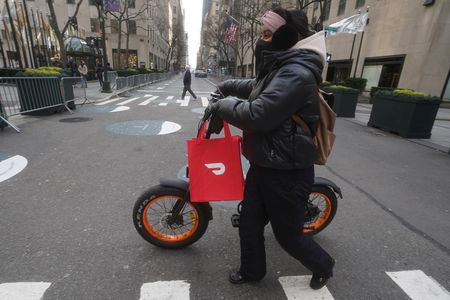By Granth Vanaik and Waylon Cunningham
(Reuters) – Shares of DoorDash sank more than 14% in extended trading on Wednesday after it projected second-quarter core profit below estimates, signaling that higher costs were offseting some gains from rising groceries and food orders.
The San Francisco-based online food delivery firm has been forced to increase minimum pay for its delivery workers after New York City and Seattle came up with new regulations.
“When I look at the business from Q4 to Q1, costs did go up,” said CFO Ravi Inukonda in an interview with Reuters, adding that the company passed on some fees to consumers.
DoorDash expects adjusted earnings before tax, interest, depreciation, and amortization between $325 million and $425 million, the mid-point of which is below an estimate of about $393.8 million, according to LSEG data.
The company said the new regulation made its platform “less accessible and less flexible” for the people who used to generate income in those cities and reduced total orders by less than 1% in the quarter.
“DoorDash will need to demonstrate growth strategies that can make up for the risk of declining volumes from restaurants in the U.S., as well as pressures from labor expenses,” Northcoast Research analyst Jim Sanderson said.
GAINED MORE MARKET SHARE IN THE QUARTER
DoorDash has been trying to branch out of its core food delivery business into newer verticals such as grocery, retail and alcohol in a bid to attract more customers to its platform amid competition from rivals UberEats and Instacart.
Its total orders rose 21%, to 620 million in the quarter.
Inukonda said DoorDash gained market share in “virtually all lines of business” across the 30 countries it operates in.
The firm’s gross order value – a key industry metric showing total value of all app orders and subscription fees – was up by 21%, to $19.24 billion in the first quarter.
It expects second-quarter GOV to be between $19 billion and $19.4 billion.
Its first-quarter revenue rose over 23%, to $2.51 billion, compared to an expectation of about $2.45 billion.
Net loss narrowed to $23 million, or 6 cents per share, compared to $161 million, or 41 cents, a year earlier.
(Reporting by Granth Vanaik in Bengaluru and Waylon Cunningham in San Antonio; Editing by Pooja Desai)


